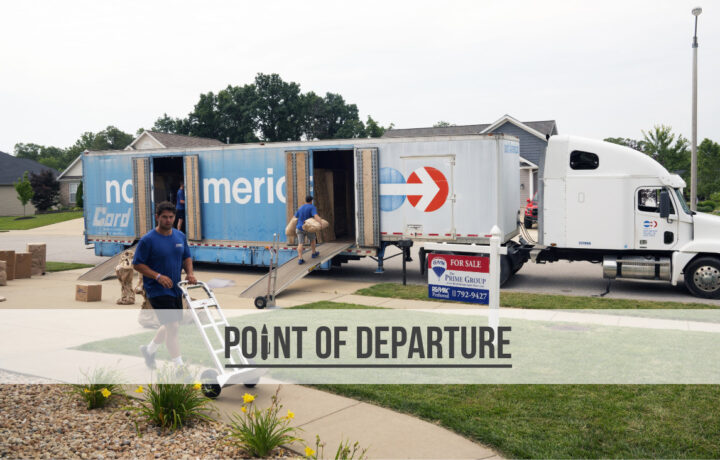When I caught one of the moving crew urinating on the side of our quarters, I should have been suspicious. When I saw one of them launching projectile vomit into our yard, I should have called the transportation office. When I discovered human excrement sprayed all over the only bathroom in our house, I should have kicked them all out.
But I didn’t. Instead, I tried to manage the situation, so our household goods were packed out without any additional drama. I called Transportation and they sent out a cleaning crew, escorted a drunken mover off the installation, and stayed long enough to ensure that we avoided any more problems.
Several months later, when our household goods arrived in Europe, all of our electronics were missing, someone – I can guess who – had vomited in one of the boxes, and another box was filled with dirty dishes from our kitchen sink and food – now completely rotten – taken from the refrigerator. Five years later when we returned to the United States, we found our household appliances had been used and effectively destroyed. All told, it was not a good PCS experience.
THE FIVE GS
If I said that was our only negative experience during a military move, I’d be lying. In 16 moves in 28 years, you learn a lot of lessons, from steps to take to ensure a smooth pack out to the value of knowing emergency first aid (trust me when I say that giving CPR to a mover on your front lawn is not for the faint of heart). No move is going to be perfect, but there’s a lot you can do to ease the pain.
1. Get ready.
Every good permanent change of station begins with a plan. Don’t wait for orders to arrive, start preparing early. This allows you to approach a move – which is likely to be a significant event – into manageable, bite-size chunks.
2. Get organized.
Every military move is an opportunity to purge yourself of the things you don’t need and to prioritize the things that matter most. The more organized you are when the moving crew shows up at your door, the more flexible you’ll be to unforeseen challenges along the way.
3. Get moved.
The less time people spend handling your household goods, the better. Pay particularly close attention to your inventory, and ruthlessly cross-check yours with that of the moving company.
4. Get on the road.
If you’ve haven’t packed five people and two dogs into two cars and driven 3,000 miles, then you haven’t lived. Find ways to make those long trips more tolerable. Your sanity will thank you.
5. Get there.
When you arrive at your destination, do everything above, but in reverse order. Get off the road, get unpacked, get reorganized, and get busy living. At least for a couple more years. Then lather, rinse, repeat.
AVOIDING THE PCS BLUES
There’s no shortage of advice on how to navigate a successful PCS move, but where should you start? Even a cursory Google search will produce pages of results. AI can also be useful, but like most things on the internet, you can’t be completely sure of its source. Reddit is also a great source of tips and practical wisdom for a military move.
In the end, listening to some of the PCS horror stories could save you an immeasurable amount of pain and suffering. Experience with moving an entire household, like most things in life, is something you typically get AFTER you need it most. But there are some tips that you won’t get from the transportation office, advice even the best expert websites don’t like to address: the kinds of things you need to know to avoid a catastrophic experience.
1. Keep your eyes peeled.
Theft is not uncommon during PCS moves. It’s safe to say that in half of our 16 moves, we had items mysteriously disappear. The house is busy, they know it, and all it takes is the right distraction to walk away with your most valued possessions. Segregate those and store them somewhere safe while you’re being packed out. And don’t get distracted by the guy peeing on your house.
2. Use Apple AirTags.
It’s simple, inexpensive technology. It won’t help you if your household goods are aboard a vessel knocking down a major metropolitan bridge, but it will help you track your shipment in near-real time. Some companies have non-tracking policies, so be prepared to bypass that obstacle if necessary. It’s your stuff. You can track it if you want to.
3. Lean into the Personally Procured Move (PPM).
Most of us still call it DITY (do-it-yourself), but it’s a great way to ensure that you have those critical or invaluable items in your control throughout the move AND get reimbursed for transporting them between stations. You’re going to end up moving some of your own goods, anyway, so you might as well get paid for it.
4. Use all of your travel time.
There are no awards or badges for crossing the country in record time, so slow down, reduce stress, and make it an adventure. It beats arriving at your new duty station looking – and feeling – like you’ve just been released from the Hanoi Hilton.
5. File a claim.
Once you arrive on station, meticulously inventory and assess your household goods, then file a claim for anything that is missing, damaged, or destroyed. Know your travel regulations and put them to use for you.
My spouse always went out of her way to provide food and beverages for our movers. It was an incredibly kind gesture that produced no measurable change in the moving experience. We still contended with theft. Items continued to be damaged in shipment. And, occasionally, something was completely destroyed. If you want a good move, then it’s up to you to make sure it goes off as planned.




